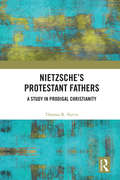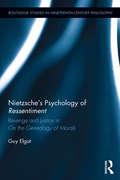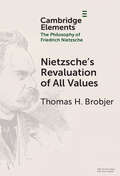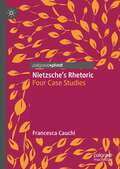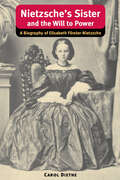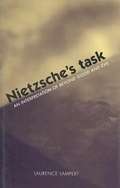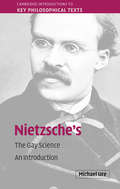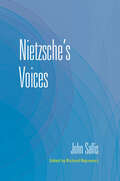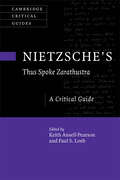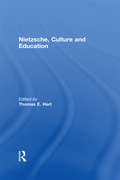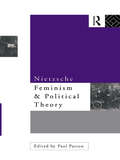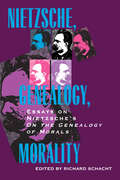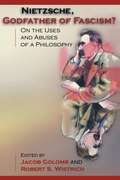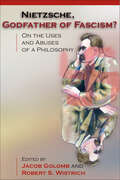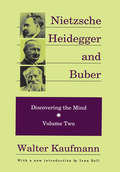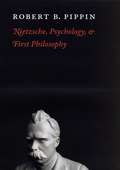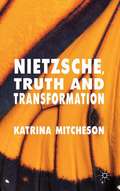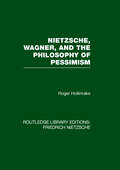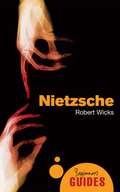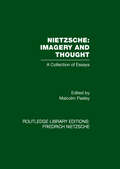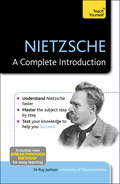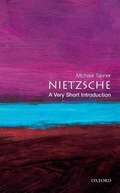- Table View
- List View
Nietzsche's Posthumanism (Posthumanities)
by Edgar LandgrafA timely and trenchant commentary on the centrality of Nietzsche&’s thought for our time While many posthumanists claim Nietzsche as one of their own, rarely do they engage his philosophy in any real depth. Nietzsche&’s Posthumanism addresses this need by exploring the continuities and disagreements between Nietzsche&’s philosophy and contemporary posthumanism. Focusing specifically on Nietzsche&’s reception of the life sciences of his day and his reflections on technology—research areas as central to Nietzsche&’s work as they are to posthumanism—Edgar Landgraf provides fresh readings of Nietzsche and a critique of post- and transhumanist philosophies. Through Landgraf&’s inquiry, lesser-known aspects of Nietzsche&’s writings emerge, including the neurophysiological basis of his epistemology (which anticipates contemporary debates on embodiment), his concerns with insects and the emergent social properties they exhibit, and his reflections on the hominization and cultivation effects of technology. In the process, Landgraf challenges major commonplaces about Nietzsche&’s philosophy, including the idea that his social theory asserts the rights of &“the strong&” over &“the weak.&” The ethos of critical posthumanism also offers a new perspective on key ethical and political contentions of Nietzsche&’s writings. Nietzsche&’s Posthumanism presents a uniquely framed introduction to tenets of Nietzsche&’s thought and major trends in posthumanism, making it an essential exploration for anyone invested in Nietzsche and his contemporary relevance, and in posthumanism and its genealogy. Retail e-book files for this title are screen-reader friendly.
Nietzsche's Protestant Fathers: A Study in Prodigal Christianity
by Thomas R. NevinNietzsche was famously an atheist, despite coming from a strongly Protestant family. This heritage influenced much of his thought, but was it in fact the very thing that led him to his atheism? This work provides a radical re-assessment of Protestantism by documenting and extrapolating Nietzsche’s view that Christianity dies from the head down. That is, through Protestantism’s inherent anarchy. In this book, Nietzsche is put into conversation with the initiatives of several powerful thinking writers; Luther, Boehme, Leibniz, and Lessing. Using Nietzsche as a critical guide to the evolution of Protestant thinking, each is shown to violate, warp, or ignore gospel injunctions, and otherwise pose hazards to the primacy of Christian ethics. Demonstrating that a responsible understanding of Protestantism as a historical movement needs to engage with its inherent flaws, this is a text that will engage scholars of philosophy, theology, and religious studies alike.
Nietzsche's Psychology of Ressentiment: Revenge and Justice in "On the Genealogy of Morals" (Routledge Studies in Nineteenth-Century Philosophy)
by Guy ElgatRessentiment—the hateful desire for revenge—plays a pivotal role in Nietzsche’s On the Genealogy of Morals. Ressentiment explains the formation of bad conscience, guilt, asceticism, and, most importantly, it motivates the "slave revolt" that gives rise to Western morality’s values. Ressentiment, however, has not enjoyed a thorough treatment in the secondary literature. This book brings it sharply into focus and provides the first detailed examination of Nietzsche’s psychology of ressentiment. Unlike other books on the Genealogy, it uses ressentiment as a key to the Genealogy and focuses on the intriguing relationship between ressentiment and justice. It shows how ressentiment, despite its blindness to justice, gives rise to moral justice—the central target of Nietzsche’s critique. This critique notwithstanding, the Genealogy shows Nietzsche’s enduring commitment to the virtue of non-moral justice: a commitment that grounds his provocative view that moral justice spells the ‘end of justice’. The result provides a novel view of Nietzsche's moral psychology in the Genealogy, his critique of morality, and his views on justice.
Nietzsche's Revaluation of All Values (Elements in the Philosophy of Friedrich Nietzsche)
by Thomas H. BrobjerWhy is Nietzsche's thought and philosophy still regarded as relevant today? There are a large number of possible answers to a question like this, but one of the most important and persuasive is that Nietzsche questioned and discussed the nature, character and value of our values. Nietzsche frequently turns other questions such as epistemological and ontological ones into axiological ones, making values pivotal in his thought. It is possible to argue that the revaluation of all values is both the most important and today the most relevant of Nietzsche's main philosophical themes and projects. Furthermore, the theme is intimately involved with what Nietzsche regarded as his most important work, his magnum opus (that he called his Hauptwerk), for a long period called The Will to Power but later Revaluation of All Values.
Nietzsche's Rhetoric: Four Case Studies
by Francesca CauchiThis book excavates the rhetorical devices that Nietzsche habitually uses and explains how they constitute a distinctive form of philosophical argumentation. Through a sustained analysis of Nietzsche’s rhetorical style, stratagems, and didactic aims in two of his early works (‘On Truth and Lies in a Non-Moral Sense’ and Daybreak) and two of his later works (Beyond Good and Evil and Twilight of the Idols), the book assesses the extent to which Nietzsche's substantial rhetorical arsenal undermines the philosophical claims he is seeking to advance. The four case studies also bring to the fore some of the less palatable aspects of Nietzsche’s thought such as racial-stereotyping, the essentialising of a so-called slave mentality, and the ranking of human beings based on a highly idiosyncratic and prejudiced view of what qualifies as noble and ignoble.
Nietzsche's Sister and the Will to Power: A Biography of Elisabeth Förster-Nietzsche (International Nietzsche Studies)
by Carol DietheA penetrating study of the sister who betrayed and endangered her famous brother's legacy In 1901, a year after her brother Friedrich's death, Elisabeth Förster-Nietzsche published The Will to Power, a hasty compilation of writings he had never intended for print. In Nietzsche's Sister and the Will to Power, Carol Diethe contends that Förster-Nietzsche's own will to power and her desire to place herself--not her brother--at the center of cultural life in Germany are centrally responsible for Nietzsche's reputation as a belligerent and proto-Fascist thinker. Offering a new look at Nietzsche's sister from a feminist perspective, this spirited and erudite biography examines why Elisabeth Förster-Nietzsche recklessly consorted with anti-Semites, from her own husband to Hitler himself, out of convenience and a desire for revenge against a brother whose love for her waned after she caused the collapse of his friendship with Lou Salomé. The book also examines their family dynamics, Nietzsche's dismissal of his sister's early writing career, and the effects of limited education on intelligent women. Diethe concludes by detailing Förster-Nietzsche's brief marriage and her subsequent colonial venture in Paraguay, maintaining that her sporadic anti-Semitism was, like most things in her life, an expedient tool for cultivating personal success and status. A volume in the series International Nietzsche Studies, edited by Richard Schacht
Nietzsche's Task: An Interpretation of Beyond Good and Evil
by Laurence LampertLaurence Lampert reveals the true meaning of the book "Beyond Good and Evil" by Nietzsche.
Nietzsche's The Gay Science: An Introduction (Cambridge Introductions to Key Philosophical Texts)
by Michael UreNietzsche's The Gay Science (1882/1887) is a deeply personal book, yet also an important work of philosophy. Nietzsche conceives it as a philosophical autobiography, a record of his own self-transformation. In beautifully composed aphorisms he communicates his central experience of overcoming pessimism and recovering the capacity to affirm joyfully the tragedy of life. On the basis of his experiments in living, Nietzsche articulates his most famous philosophical concepts and images: the death of God, the exercise of eternal recurrence, and the ideal of self-fashioning. This book explains the ancient and modern philosophical contexts that shape Nietzsche's central concern with the affirmation of life. It surveys Nietzsche's philosophy as a whole, explains the pivotal place of The Gay Science as the source of his ideal of tragic joy, and shows how he revives an ancient conception of philosophy as a way of life and the philosopher as physician.
Nietzsche's Voices (The Collected Writings of John Sallis)
by John SallisNietzsche's Voices, a much-anticipated volume of the Collected Writings of John Sallis, presents his two-semester lecture course on Nietzsche offered in the Philosophy Department of Duquesne University during the school year 1971–72."Nietzsche is easy to read; his is apparently the easiest of all the great philosophies. Yet the easy intelligibility is deceptive. Nietzsche's writings make us believe we have understood when in fact we have not. His philosophy is actually the exact opposite of easy," says Sallis. With this warning always in mind, Sallis first discusses Nietzsche's life and the relevance of the ancient Greeks to his thought and then analyzes Nietzsche's views on truth, history, morality, and the death of God. The entire second half of the book is devoted to Nietzsche's main work, the tragic, comedic, poetic Thus Spoke Zarathustra.Nietzsche's Voices offers a sensitive and brilliant introduction to the thought of Friedrich Nietzsche, as presented by one of today's most significant philosophers.
Nietzsche's ‘Thus Spoke Zarathustra': A Critical Guide (Cambridge Critical Guides)
by Paul S. Loeb Keith Ansell-PearsonNietzsche regarded Thus Spoke Zarathustra as his most important philosophical contribution because it proposes solutions to the problems and questions he poses in his later books – for example, his cure for the human disposition to vengefulness and his creation of new values as the antidote to nihilism. It is also the only place where he elaborates his concepts of the superhuman and the eternal recurrence of the same. In this Critical Guide, an international group of distinguished scholars analyze the philosophical ideas in Thus Spoke Zarathustra, discussing a range of topics that include literary parody as philosophical critique, philosophy as a way of life, the meaning of human life, philosophical naturalism, fatalism, radical flux, human passions and virtues, great politics, transhumanism, and ecological conscience. The volume will be invaluable for philosophers, scholars and students interested in Nietzsche's thought.
Nietzsche, Culture and Education
by Thomas E. HartIn the spring of 1872 Friedrich Nietzsche gave a series of public lectures titled 'On the Future of our Educational Institution' to an audience in Basel, Switzerland. In the lectures he made clear his attitude about what was wrong with education and how it had negatively affected the culture of his day. More than one hundred years after the death of Nietzsche, his legacy remains one of the most pervasive in philosophical thought. While his influence on philosophical thought concerning culture is everywhere to be found, his influence on the philosophy of education has yet to find a place in mainstream thought on the subject, in spite of the inextricable connection between the two. This collection has been put together in an effort to redress this situation. Nietzsche, Culture and Education brings together a collection of specially commissioned essays on the theme of Nietzsche's cultural critique and its use in and effect on educational theory. The international character of the contributors gives this work a polyvalent perspective on these areas of Nietzsche's philosophy. This publication will be a valuable source book for both undergraduate and postgraduate students of philosophy, education and the social sciences as well as for Nietzsche specialists.
Nietzsche, Feminism and Political Theory
by Paul PattonAre you visiting women? Do not forget your whip!''Thus Spoke Zarathustra'the democratic movement is...a form assumed by man in decay'Beyond Good and EvilNietzsche's views on women and politics have long been the most embarrassing aspects of his thought. Why then has the work of Nietzsche aroused so much interest in recent years from feminist theorists and political philosophers?In answer, this collection comprises twelve outsanding essays on Mietzsche 's work to current debates in feminist and political theory, It is the first to focus on the way in which Nietzche has become an essential point of reference for postmodern ehtical and political thought.
Nietzsche, Freud, Benn, and the Azure Spell of Liguria
by Martina KolbThe Mediterranean region of Liguria, where the Maritime Alps sweep down to the coasts of northwest Italy and southeast France, the Riviera, marks the intersection of two of Europe's major cultural landscapes. Remote, liminal, compact, and steep, the terrain has influenced many international authors and artists. In this study, Martina Kolb traces Liguria's specific impact on the works of three seminal German-writing modernists - Friedrich Nietzsche, Sigmund Freud, and Gottfried Benn - whose encounters with Ligurian lands and seas led to an innovative geopoetic fusion of word and world.Kolb examines each of these authors' acquired affinities with Ligurian and Provençal landscapes and seascapes, revisiting and reassessing the long tradition of northern longing for a Mediterranean south. She also shows how Freud and Benn followed in the footsteps of Nietzsche in his most prolific years, a topic which has received little critical attention to date. Nietzsche, Freud, Benn, and the Azure Spell of Liguria offers a fresh approach to these writers' groundbreaking literary achievements and profound interest in poetic expression as cathartic self-liberation.
Nietzsche, Genealogy, Morality: Essays on Nietzsche's <i>On the Genealogy of Morals</i> (Philosophical Traditions #5)
by Richard SchachtWritten at the height of the philosopher's intellectual powers, Friedrich Nietzsche's On the Genealogy of Morals has become one of the key texts of recent Western philosophy. Its essayistic style affords a unique opportunity to observe many of Nietzsche's persisting concerns coming together in an illuminating constellation. A profound influence on psychoanalysis, antihistoricism, and poststructuralism and an abiding challenge to ethical theory, Nietzsche's book addresses many of the major philosophical problems and possibilities of modernity.In this unique collection focusing on the Genealogy, twenty-five notable philosophers offer diverse discussions of the book's central themes and concepts. They explore such notions as ressentiment, asceticism, "slave" and "master" moralities, and what Nietzsche calls "genealogy" and its relation to other forms of inquiry in his work. The book presents a cross section of contemporary Nietzsche scholarship and philosophical investigation that is certain to interest philosophers, intellectual and cultural historians, and anyone concerned with one of the master thinkers of the modern age.
Nietzsche, Godfather of Fascism? On the Uses and Abuses of a Philosophy
by Robert S. Wistrich Jacob GolombNietzsche, the Godfather of Fascism? What can Nietzsche have in common with this murderous ideology? Frequently described as the "radical aristocrat" of the spirit, Nietzsche abhorred mass culture and strove to cultivate an Übermensch endowed with exceptional mental qualities. What can such a thinker have in common with the fascistic manipulation of the masses for chauvinistic goals that crushed the autonomy of the individual? The question that lies at the heart of this collection is how Nietzsche came to acquire the deadly "honor" of being considered the philosopher of the Third Reich and whether such claims had any justification. Does it make any sense to hold him in some way responsible for the horrors of Auschwitz? The editors present a range of views that attempt to do justice to the ambiguity and richness of Nietzsche's thought. First-rate contributions by a variety of distinguished philosophers and historians explore in depth Nietzsche's attitudes toward Jews, Judaism, Christianity, anti-Semitism, and National Socialism. They interrogate Nietzsche's writings for fascist and anti-Semitic proclivities and consider how they were read by fascists who claimed Nietzsche as their intellectual godfather. There is much that is disturbingly antiegalitarian and antidemocratic in Nietzsche, and his writings on Jews are open to differing interpretations. Yet his emphasis on individualism and contempt for German nationalism and anti-Semitism put him at stark odds with Nazi ideology. The Nietzsche that emerges here is a tragic prophet of the spiritual vacuum that produced the twentieth century's totalitarian movements, the thinker who best diagnosed the pathologies of fin-de-siècle European culture. Nietzsche dared to look into the abyss of modern nihilism. This book tells us what he found.
Nietzsche, Godfather of Fascism?: On the Uses and Abuses of a Philosophy
by Jacob Golomb & Robert S.WistrichNietzsche, the Godfather of Fascism? What can Nietzsche have in common with this murderous ideology? Frequently described as the "radical aristocrat" of the spirit, Nietzsche abhorred mass culture and strove to cultivate an Übermensch endowed with exceptional mental qualities. What can such a thinker have in common with the fascistic manipulation of the masses for chauvinistic goals that crushed the autonomy of the individual? The question that lies at the heart of this collection is how Nietzsche came to acquire the deadly "honor" of being considered the philosopher of the Third Reich and whether such claims had any justification. Does it make any sense to hold him in some way responsible for the horrors of Auschwitz? The editors present a range of views that attempt to do justice to the ambiguity and richness of Nietzsche's thought. First-rate contributions by a variety of distinguished philosophers and historians explore in depth Nietzsche's attitudes toward Jews, Judaism, Christianity, anti-Semitism, and National Socialism. They interrogate Nietzsche's writings for fascist and anti-Semitic proclivities and consider how they were read by fascists who claimed Nietzsche as their intellectual godfather. There is much that is disturbingly antiegalitarian and antidemocratic in Nietzsche, and his writings on Jews are open to differing interpretations. Yet his emphasis on individualism and contempt for German nationalism and anti-Semitism put him at stark odds with Nazi ideology. The Nietzsche that emerges here is a tragic prophet of the spiritual vacuum that produced the twentieth century's totalitarian movements, the thinker who best diagnosed the pathologies of fin-de-siècle European culture. Nietzsche dared to look into the abyss of modern nihilism. This book tells us what he found. The contributors are Menahem Brinker, Daniel W. Conway, Stanley Corngold, Kurt Rudolf Fischer, Jacob Golomb, Robert C. Holub, Berel Lang, Wolfgang Müller-Lauter, Alexander Nehamas, David Ohana, Roderick Stackelberg, Mario Sznajder, Geoffrey Waite, Robert S. Wistrich, and Yirmiyahu Yovel.
Nietzsche, Heidegger, and Buber (Discovering The Mind Ser.)
by Walter KaufmannIn this second volume of a trilogy that represents a landmark contribution to philosophy, psychology, and intellectual history, Walter Kaufmann has selected three seminal figures of the modem period who have radically altered our understanding of what it is to be human. His interpretations of Nietzsche, Heidegger, and Buber are lively, accessible, and penetrating, and in the best scholarly tradition they challenge and revise accepted views.After an introductory chapter on Kierkegaard and Schopenhauer, with particular attention to the former's views on despair and the latter's on insanity and repression, Kaufmann argues that Nietzsche was the first great depth psychologist and shows how he revolutionized human self-understanding. Nietzsche's psychology, including his fascinating psychology of masks, is discussed fully and expertly.Heidegger's version of existentialism is herein subjected to a devastating attack. After criticizing it, Kaufmann shows how the same mentality finds expression in Heidegger's philosophy and in his now-infamous pro-Nazi writings. Here, as in his portraits of other major thinkers, the author's concern is to show that his subjects are of one piece.
Nietzsche, Psychology, and First Philosophy
by Robert B. PippinFriedrich Nietzsche is one of the most elusive thinkers in the philosophical tradition. His highly unusual style and insistence on what remains hidden or unsaid in his writing make pinning him to a particular position tricky. Nonetheless, certain readings of his work have become standard and influential. In this major new interpretation of Nietzsche's work, Robert B. Pippin challenges various traditional views of Nietzsche, taking him at his word when he says that his writing can best be understood as a kind of psychology. Pippin traces this idea of Nietzsche as a psychologist to his admiration for the French moralists: La Rochefoucauld, Pascal, Stendhal, and especially Montaigne. In distinction from philosophers, Pippin shows, these writers avoided grand metaphysical theories in favor of reflections on life as lived and experienced. Aligning himself with this project, Nietzsche sought to make psychology "the queen of the sciences" and the "path to the fundamental problems. " Pippin contends that Nietzsche's singular prose was an essential part of this goal, and so he organizes the book around four of Nietzsche's most important images and metaphors: that truth could be a woman, that a science could be gay, that God could have died, and that an agent is as much one with his act as lightning is with its flash. Expanded from a series of lectures Pippin delivered at the Collège de France, Nietzsche, Psychology, and First Philosophy offers a brilliant, novel, and accessible reading of this seminal thinker.
Nietzsche, Truth And Transformation
by Katrina MitchesonNietzsche scholarship has fallen into the trap of taking seriously either the epistemological or the existential import of Nietzsche's views on truth at the neglect of the other, obscuring a full understanding of Nietzsche's philosophy, and the potential of his methodology to contribute to the problem of how we can effect deliberate transformation. Nietzsche, Truth and Transformation addresses this gap by treating both these dimensions of Nietzsche's approach to truth in depth and considering their interrelation. It addresses the philosophical problem of on what basis, if knowledge is always from a perspective, one can criticise modern humanity and culture, and how such critique can be actively responded to. As well as providing a novel interpretation of Nietzsche's philosophical method, this book shows the continuing relevance of Nietzsche for contemporary debates in epistemology and to concerns for cultural and social change.
Nietzsche, Wagner and the Philosophy of Pessimism (Rouledge Library Editions: Friedrich Nietzsche)
by Roger HollinrakeNietzsche’s relationship with Wagner has long been a source of controversy and has given rise to a number of important studies, including this major breakthrough in Nietzsche scholarship, first published in 1982. In this work Hollinrake contends that the nature and extent of the anti-Wagnerian pastiche and polemic in Thus Spake Zarathustra is arguably the most important factor in the association between the two. Thus Wagner, as the purveyor of a particular brand of Schopenhauerian pessimism, is here revealed as one of the principle sources – and targets – of Zarathustra. Whilst addressed primarily to students of German Literature, this book will also be of interest to musicians, philosophers and students of the history of culture and ideas.
Nietzsche: 'On the Genealogy of Morality'
by Friedrich Nietzsche Keith Ansell-Pearson Carol DietheFriedrich Nietzsche is one of the most influential thinkers of the past 150 years and On the Genealogy of Morality (1887) is his most important work on ethics and politics. A polemical contribution to moral and political theory, it offers a critique of moral values and traces the historical evolution of concepts such as guilt, conscience, responsibility, law and justice. This is a revised and updated 2006 edition of one of the most successful volumes to appear in Cambridge Texts in the History of Political Thought. Keith Ansell-Pearson modified his introduction to Nietzsche's classic text, and Carol Diethe incorporated a number of changes to the translation itself, reflecting the considerable advances in our understanding of Nietzsche. In this guise the Cambridge Texts edition of Nietzsche's Genealogy should continue to enjoy widespread adoption, at both undergraduate and graduate level.
Nietzsche: A Beginner's Guide (Beginner's Guides)
by Robert WicksOften quoted, influential, and highly divisive, Nietzsche remains an enigma long after his death. This clear primer moves deftly through the controversy to examine the philosopher's work in the context of his tumultuous childhood and Christian upbringing. Discussing his infamous declaration that "God is dead", his posthumous association with Nazism, and his criticisms of conventional morality, this book is the ideal introduction to the much debated thinker and his extensive legacy.
Nietzsche: A Collection of Essays
by Malcolm PasleyThe central theme of this collection of essays, first published in 1978, is the basic tension in Nietzsche, and so in his work, between the urge to weave a satisfying web out of reality and the equally strong compulsion to expose its painful truths. The book aims to stress, not to play down, the embarassing and fruitful fact that he cannot be neatly pigeonholed either as a literary figure or as a professional philosopher. The book meets a long-felt need for a study in English of both the literary and the philosophical aspects of Nietzsche's work, based on his authentic texts, and will be welcomed by all students of modern European thought and Literature.
Nietzsche: A Complete Introduction: Teach Yourself
by Roy JacksonWritten by Dr Roy Jackson, who is Course Leader in Religion, Philosophy and Ethics at the University of Gloucestershire, Nietzsche: A Complete Introduction is designed to give you everything you need to succeed, all in one place. It covers the key areas that students are expected to be confident in, outlining the basics in clear jargon-free English, and then providing added-value features like summaries of key books, and even lists of questions you might be asked in your seminar or exam.The book uses a structure that mirrors the way Nietzsche is studied on many university courses, with chapters looking at Nietzsche's life, The Birth of Tragedy, the revaluation of all values, the will to power, Thus Spoke Zarathustra, truth and perspectivism, religion, politics, and Nietsche's legacy.
Nietzsche: A Very Short Introduction
by Michael TannerFriedrich Nietzsche (1844-1900) was a German philosopher, almost wholly neglected during his sane life, which came to an abrupt end early in 1889. 'Nietzsche' is the figure in whose name people of the most astonishingly discrepant and various views have sought to find justification for them.

